The horrific attacks of October 7th on Jews in Israel have prompted pro-Palestinian groups, including several at UVA, to rally in support of Hamas. In recent days, we have heard growing calls for support of Palestinians and condemnation of Israel as the Israeli Defense Forces and Iran’s proxies – Hamas, Hezbollah, Islamic Jihad, and Ansar Allah (the Houthi movement in Yemen) wage the most significant war in and around Israel in years. This is a war precipitated solely by Hamas’ surprise terror attack of unprecedented scale and proportion on unarmed Israeli civilians.
A common theme across the statements of pro-Palestinian groups and many university administrators and faculty is an explicit or implicit assertion of some moral equivalence between the suffering of human shields in Gaza and the victims of barbaric terror attacks in Israel. The linguistic turn that Hamas’ apologists employ most commonly is the ‘yes, but…’ device.
Some responded to these abhorrent statements with calls to restrict free speech, to sanction the terrorists’ enablers formally, and to quell somehow this pruriently hateful speech. I disagree. Most vehemently. Let the antisemites have their say. Why? Because now we know with certainty what they believe and how they genuinely feel about others in our community.
The downside of strict censorship is uncertainty about peoples’ actual beliefs. For example, by making the use of the n-word utterly forbidden, we protect the sensibilities of Black people who would suffer, at a minimum, great offense and possibly some genuine harm. However, the cost of that protection is that it enhances the ability of the faithful or casual racists to hide in our midst.
If we were to bar pro-Palestinian groups, students, adults, and organizations from being open about their views, we would shield ourselves from having to confront the knowledge that there are rabid antisemites in our midst. The individuals and groups who support Hamas are apologists for the executioners of the most deliberate heinous violence against true innocents: babies and infants killed in front of their mothers; entire families shot to death while trying to hide in closets; children forced to watch as their siblings were murdered in front of their eyes; and over 250 young people slaughtered at a concert.
How do we know these killings were deliberate and not accidental or some euphemistically-framed collateral damage? Because the invaders from Gaza, the Hamas terrorists, were caught in the act on surveillance cameras. Bizarrely, they videotaped themselves as they shot concertgoers and murdered children. Sickeningly, they called home to brag to their parents about the murders they had just committed. It is beyond civilized comprehension, but they filmed and photographed themselves raping women and beheading babies.
In the days immediately following Hamas’ violations of the most basic human dignities, we have come to know who at the University of Virginia are their ideological confrères. That knowledge is both important and useful. When a student asks for a letter of recommendation and their resume or LinkedIn page reveals they are a member of Students for Justice in Palestine, for example, I will now know I should be sure to point that fact out to potential employers. We can let others judge the meaning of that membership, though, to most, it will be clear.
Several years ago, as Dean of UVA’s School of Leadership and Public Policy, a progressive professor tried to explain to me how we, the school, needed to make greater efforts to confront implicit bias. I asked this professor about explicit bias – racism, antisemitism. The professor asked what I meant. I explained that true racists, antisemites, and bigots existed, and some were most assuredly in our community. I said we should focus on the most despicable and then turn to the more mundane. The professor explained that the days of explicitly racist and openly antisemitic students and faculty at UVA were long gone.
Over the past two weeks, hate-filled individuals exercising their right to free speech have taught us that genuine racism and unrepentant antisemitism still exist. I’m glad we can know who the real racists and antisemites are. Ironically, the speech of some and the silence of others have revealed their true character.
This column has been republished with permission from The Jefferson Council blog. Allan C. Stam is University Professor and Professor of Politics and Public Policy at the Batten School of Leadership and a member of The Jefferson Council advisory board.



